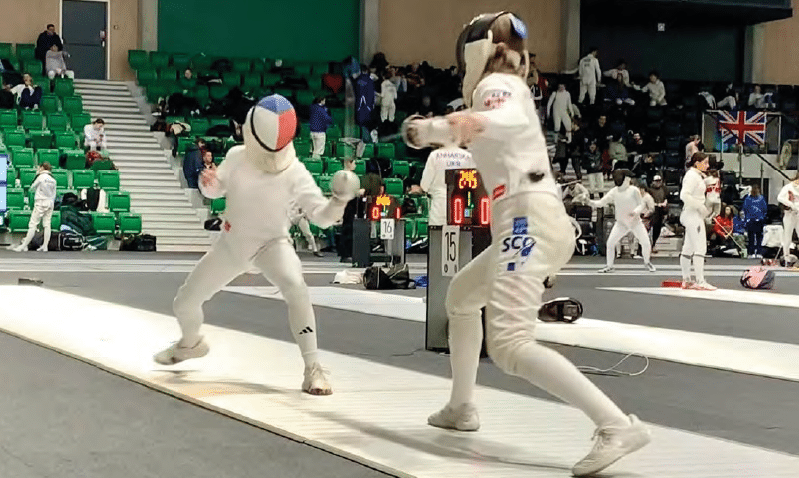Royal Tunbridge Wells Fencing Club are looking ‘to step up to the next level’, despite success already in 2024 at county, regional and national series level.
The local club, founded in 2005 by Jerry Raj and three-time Olympian Steven Paul, has 70 active members, with the largest group of their cohort being teenagers. But they also have members fencing at the age of six right the way through to their oldest member, Don Coe aged 92, who is the club’s armourer and one of their assistant coaches.
The club specialises in Épée fencing which has several key differences to the other two fencing weapons, Foil and Sabre. In Épée, the whole body from head to toe is a target and both fencers can score at the same time, whereas Foil and Sabre both have limited target areas and ‘right of way’ rules that mean only one fencer can score at any given time.
However, all three weapons follow the same competition structure – preliminary bouts are first to five points or three minutes long and knockout bouts are first to 15 points or the fencer with the most points after three periods of three minutes.
Training sessions run three times a week, Monday and Thursday evenings and Sunday mornings, at the army reserve centre on St John’s Road, with each session typically divided into under-12, under-14, under-20 and adults to ensure specific coaching support for each age group. Despite fencing generally being an individualistic sport, the club tries to ensure training sessions are fun and foster team spirit, as ‘character and camaraderie’ are just as important to the club as competitiveness.
Valerie Cramb, RTWFC welfare officer added: “The group of fencers now at the top of Cadet (under-17) and Junior (under-20) age groups have been with the club since they started fencing. They have grown and developed their fencing together.
“The club has built an atmosphere of camaraderie, with many of them becoming friends as well as training mates and competitors – pushing each other on and supporting each other to be the best they can be. Our fencers train hard but also enjoy the social aspects of being in the club.”
Since the start of the year, the club has had several champions at county, regional and national series level (Benedict Graham, Annabelle Lavin, Izzie D’Abbraccio, Eilidh Paterson and Andrea Ross), along with five bronzes at regional level and 19 qualifiers for the British Youth Championships in Sheffield in May, a record number for the club. Furthermore, three of the club’s top fencers Lloyd Osborne, Eilidh Paterson and Annabelle Lavin have also represented Britain on the European Cadet Circuit.
But the club’s Head Coach Paul Beasley has told the Times that the club has no plans to stop there and wants to help their fencers reach their highest potential.
He said: “We want to achieve what we haven’t yet achieved at under-17 and under-20 level, but not at the expense of the continued success of our under-14 fencers – this is the foundation for future excellence in the older age groups.”
“Over the past two seasons, we’ve had five under-17 (‘Cadet’) fencers – Benedict, Lloyd, Eilidh, Andrea and Miles Raymond – selected to fence for Britain on the European Cadet Circuit. Next season, we’re hoping that Izzie, Alec, Zach Bench, Daisy Beadsworth and Hiba Rochdi will do well enough to be selected as well.”
“As a club, we’re always looking to step up to the next level, and this now means our fencers scoring enough points on the European Cadet circuit to be selected to represent Britain at the World Cadet Championships in China in 2025 – both Lloyd and Eilidh do have a genuine chance of achieving the qualification criteria.
“We will continue to do what we can to support all of our fencers along their own pathways to success – whether this is defined as enjoying a sporting environment in which they feel valued, or stepping onto the podium at county, regional, British or even World level.”
The club plans to take its fencers to a training camp in Budapest again this summer. Paul explained that the ‘generally higher level of Hungarian épée fencing’ helps prepare the club’s teenage fencers for the challenges of domestic ranking competitions and the sharper skills that they may face in international competitions.








